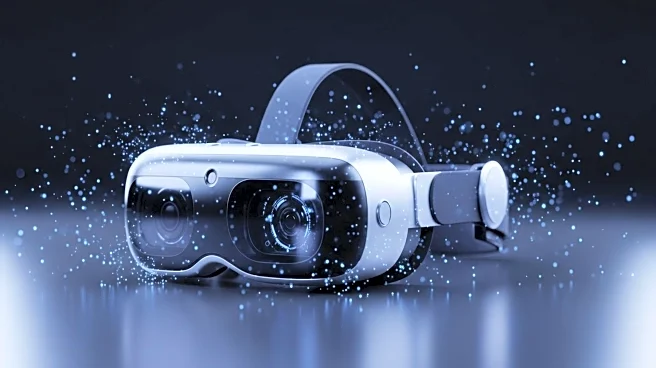What's Happening?
The year 2025 is witnessing significant shifts in augmented reality (AR) technology, with seven key developments poised to transform consumer tech. Meta has unveiled display-capable Ray-Ban/Oakley glasses, Amazon is developing AR glasses under the codename Jayhawk, and Snap continues to push lightweight AR with its Specs. These advancements, along with Google's partnerships for affordable AR hardware, are compressing years of product development into months. The introduction of biometric sensors in AR prototypes is turning glasses into health data hubs, raising privacy concerns that regulators will monitor closely.
Why It's Important?
These developments in AR technology are reshaping the consumer tech landscape, offering new ways for users to interact with digital content. The integration of biometric sensors and AI-driven experiences in AR devices could change consumer preferences, potentially reducing reliance on traditional smartphones and watches. As AR technology becomes more accessible, it could impact industries such as retail, healthcare, and entertainment, offering new opportunities for engagement and innovation. The rapid pace of development highlights the importance of staying informed about emerging technologies and their potential implications.
What's Next?
As AR technology continues to evolve, stakeholders will be watching for further advancements in device capabilities and user experiences. The introduction of biometric sensors in AR devices could lead to new applications in health monitoring and wellness, while AI-driven experiences may offer more personalized interactions. The industry will be keen to see how these developments impact consumer adoption and the broader market for augmented reality technology. Privacy concerns will also be a key focus, as regulators assess the implications of biometric data collection and usage.
Beyond the Headlines
The rapid development of AR technology raises questions about the ethical and legal implications of biometric data collection and usage. As AR devices become more integrated into daily life, there may be increased scrutiny on how personal data is handled and protected. Additionally, the cultural impact of AR technology could be significant, as users become more accustomed to interacting with digital content in new and immersive ways. The long-term effects on industries such as retail, healthcare, and entertainment could be profound, as AR technology offers new opportunities for innovation and engagement.









